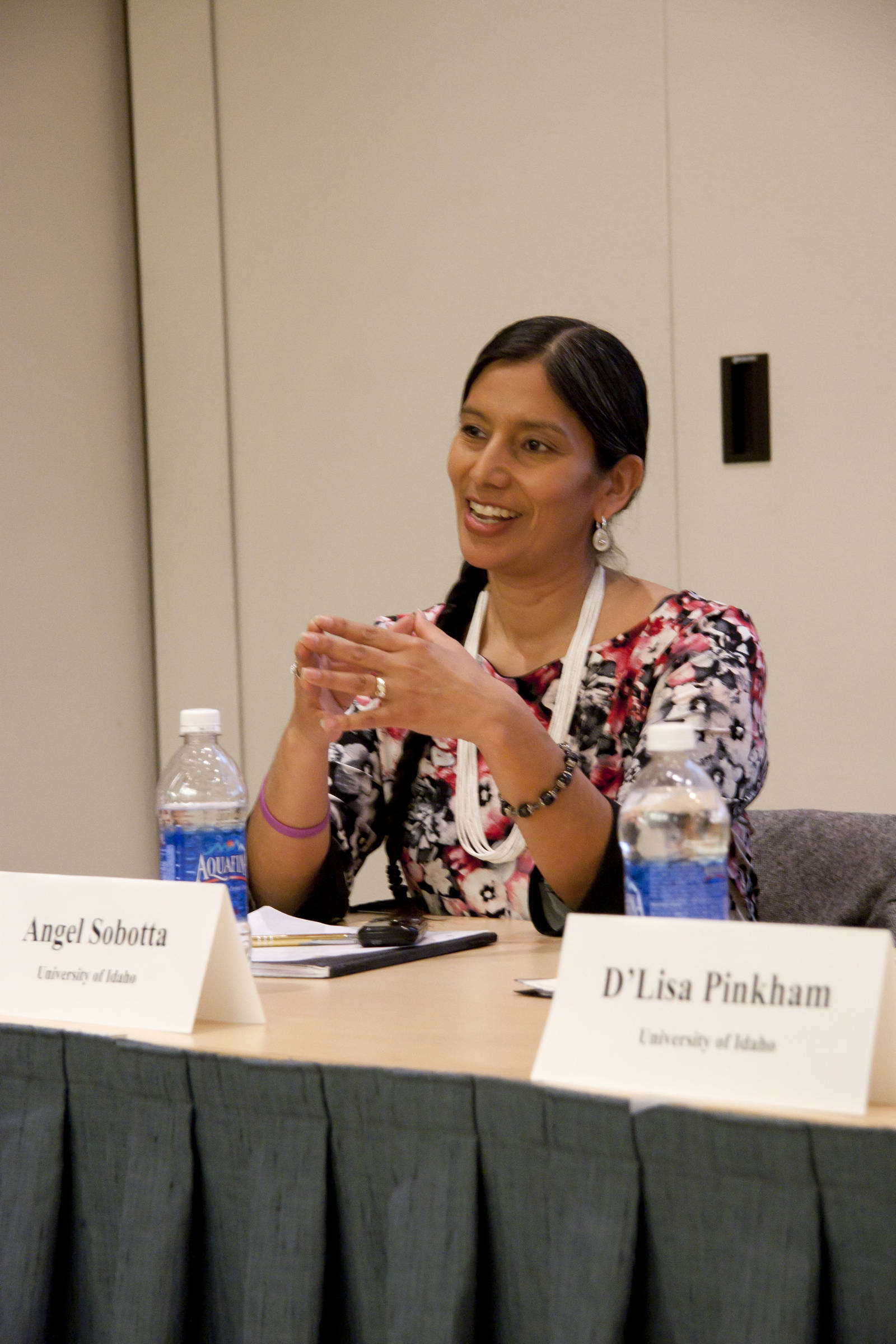ABSTRACT
Our panel will discuss the common strand in each of our braids: How we each uniquely related to the four Foundational Principals of Indigenous Knowledge (epistemology) which include; Wisdom Sits in Places, the Circle of Life/Sacred Hoop, All My Relations, and the Oral Tradition. Within the four principals are guidelines for ethical research-- the three R's-- Respect, Reciprocity, and Responsibility.
BIOGRAPHY
D'Lisa Penney-Pinkham is an enrolled Nimíipuu and a proud 5th grade public school teacher at Lapwai Elementary. D'Lisa holds a Master's Degree in Education from WSU, and is currently a UI doctoral student pursuing a Ph.D. in Curriculum and Instruction. She has been teaching for 13 years, 7 of them spent at Lapwai. Throughout her teaching career D'Lisa has been reflective on her own learning journey as her teaching philosophy and pedagogy focused on the importance of culturally responsive teaching and culturally relevant and resonant learning experiences for her native students. Analysis of available curriculum, materials of best practices, and a need for teacher preparation programs to represent specific Indigenous learning theories and practices inspired D'Lisa to focus on the development and implementation of place-based and cultural-based education. "Indigeneity" became a term used in the first Indigenous theories course at UI, and D'Lisa saw the importance of "sense of place" and oral traditions as themes in her own teaching style. In studying the Indigenous perspectives of Shawn Wilson, D'Lisa saw, too, that storytelling became the research, and the storyteller became the researcher. Linda T. Smith's work on Decolonizing Methodologies helped D'Lisa to define what she was feeling, but couldn't explain was happening as she taught in the public school system. She then began working with her Indigenous cohort to outline an Indigenous Research Framework, which they presented to the College of Graduate Studies. Further enthusiam was created when the Indigenous cohort presented their framework at the 7th WSU COE International Globalization and Diversity and Education Conference. She is now working on using an Indigenous Research framework that reflects her world views, including the epistemology and axiology of the Nimíipuu. It is her hope that the way in which she pursues her research includes respect, reciprocity and responsibility, three key tenets to her Indigenous Research Framework.
Renée Holt is Dine from the Sleeping Rock or With the Rock clan and enrolled with the Nez Perce tribe of Idaho. Renée is a mother of three and the Graduate Assistant Coordinator for the Washington State University Plateau Center for American Indian Studies and the Clearinghouse on Native Teaching & Learning. As a third year PhD student in the College of Education, Cultural Studies and Social Thought program, she also presently serves as the Secretary for the Board of Directors for National Indian Education Association, the oldest and largest Indian education organization and actively involved with the American Indian Studies Association.
María Isabel Morales is a first generation Mexicana/Mestiza/Chicana college graduate from Eastern Washington University. She obtained her bachelor's degree in Interdisciplinary Studies with an emphasis in Sociology and Spanish and minor in Chicana/o Latina/o Studies. She is a first generation immigrant from the state of Michoacán and the oldest of three. She is currently a second year doctoral student in the Cultural Studies and Social Thought in Education program at Washington State University. Some of María's research interest revolves around immigration and education, particularly access and equity for 'undocumented' students. All the work she has done and the work she has yet to do is inspired by her familia, and her comunidad, whom she hopes to one day serve as an activist scholar.
Lynn Becerra (Mexican American/Chicana/Mestiza), is a first-generation college graduate from the University of California, Santa Barbara with a bachelor's degree in Chicana and Chicano Studies. She is currently a second year doctoral student in the Cultural Studies and Social Thought in Education program at Washington State University. She is the younger sister of one and the older sister of two. Lynn's current research interests include working for access and equity for underrepresented students in P-20 education and aspires to be an activist-scholar. Lynn chooses to utilize a Critical Race Gender, Chicana Feminist and Indigenous Ways of Knowing approach to her work. She is indebted to the many scholars from marginalized communities who have worked on her behalf—both within and outside of the academy—and hope to do the same for the next generation.
Angel Sobotta – Is an enrolled Nimíipuu, aka Nez Perce. She resides in Lapwai, Idaho with her husband Bob Sobotta and their children, Payton - age 11, Glory - age 9, Grace - age 8 and Faith - age 4. Angel has been employed with the Nez Perce Tribe's Language Program for over 13 years. She has experience in theater and film. She wrote the scripts for the documentaries, "'ipsqilaanx heewtnin' weetespe – Walking on Sacred Ground – the Nez Perce Lolo Trail" as well as, "Surviving Lewis and Clark – the Nimíipuu Story" which won an Aurora and Telly awards respectively. Angel's family raises appaloosa horses in which they have the largest herd of horses for a Nimíipuu family. She will graduate from the University of Idaho in 2013 with an inter-disciplinary Masters focusing on Nez Perce language.
For more information: Rodney Frey



